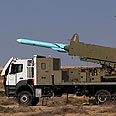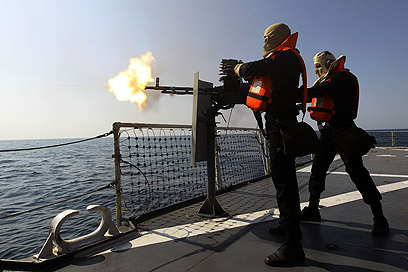
Iran defiant amid appeals for European sanctions
Western powers are rallying behind tougher oil, financial sanctions as a crippling tool against Tehran's nuclear program but Islamic Republic is showing defiant front
Iran has closed out naval war games in the Persian Gulf much the way they began last month: striking a tone of military defiance while Western powers rallied behind tougher oil and financial sanctions as a crippling tool against Tehran's nuclear program.
The standoff atmosphere, less than a week after Iran warned it could block one of the world's key oil tanker sea lanes in response to economic pressures, appeared to deepen further with an Iranian general suggesting a US aircraft carrier is not welcome to return to the Gulf.
Related stories
- Iran to US carrier: Stay out' of Persian Gulf
- Iran test-fires long range missiles
- Iran: Currency plunge not tied to sanctions
In Paris, meanwhile, France's foreign minister said there is "no doubt" that Iran is moving toward a nuclear weapon and urged Europe to match America's tighter sanctions set in motion last week. Alain Juppe said the measures could include targeting Iran's Central Bank and imposing an Iranian oil embargo.

Iran's war games in Persian Gulf (Photo: MCT)
A Western snub of one of OPEC's heavyweight exporters would still leave Iran with many oil-hungry markets such as China and India and give Tehran crucial economic lifelines to resist the US and its allies.
But worries that Gulf tensions could disrupt supplies sent oil above $101 a barrel and piled more pressure on Iran's currency, the rial, which hit record lows against the dollar earlier this week.
"It's clear the economy is in dire straits and the sanctions are having an impact no matter what Iranian officials say," said Salman Shaikh, director of The Brookings Doha Center in Qatar. "Hitting the oil sectors may push the economy down even further, but that doesn't mean Iran will bend to the West."
Iran has proposed restarting international talks on its nuclear program, which Tehran insists is only for peaceful energy and research purposes. The offer to reopen dialogue is widely interpreted as a sign that Western sanctions are taking a serious bite. But the outreach could also include preconditions such as easing the economic pressures, which would likely meet strong resistance in Washington and elsewhere.
"This has become the classic Iranian approach all along with the nuclear issue: try to buy some time with offers of cooperation but then coming back with the hard line," Shaikh said.
As 10-day naval maneuvers wrapped up Tuesday, Iran's army chief, Gen. Ataollah Salehi, said an "American warship" that left the Gulf should not return. He didn't cite a specific vessel, but the US Navy's 5th Fleet has said that the aircraft carrier USS John C. Stennis and another vessel headed out from the Gulf and through the Strait of Hormuz last week after a visit to Dubai's Jebel Ali port.
Increasing rhetoric
Pentagon spokesman George Little said Tuesday the US presence in the Gulf is in compliance with international law and the Navy would maintain what he called a "constant state of high vigilance" in order to ensure the flow of sea commerce.
Olivier Jakob, managing director of oil consultancy Petromatrix in Switzerland, said oil markets are now pricing in the potential risks in the Gulf.
"Iran ... is trying to send the message that you need to be very careful in passing the red line, and the rhetoric is increasing on both sides of the Strait," he said.
The latest push from the West came from France, which urged Europe to agree on stricter sanctions against Iran by the end of the month. Juppe, the foreign minister, told the French television channel I-Tele that European partners should follow the US example, including a freeze on the Iranian central bank's assets and an embargo on Iran's oil exports.
Iran has tried to play down any links between the new US sanctions, which have yet to take effect and the nosedive of the Iranian rial. "For the time being, it has nothing to do with foreign policy," said Foreign Ministry spokesman Ramin Mehmanparast.
But officials are clearly nervous. The semiofficial Mehr news agency said the Central Bank was planning on holding a meeting of fiscal experts Wednesday.
A Tehran-based economist, Gholamreza Kiamehr, said any economic pressures now have only "short-term psychological effects" after four rounds of U.N. sanctions since 2006 and other measures by the U and allies.
"The sanctions will not have a paralyzing effect on Iran because of Iran's geopolitics, resources and access to the open seas," he said.
- Receive Ynetnews updates directly to your desktop










